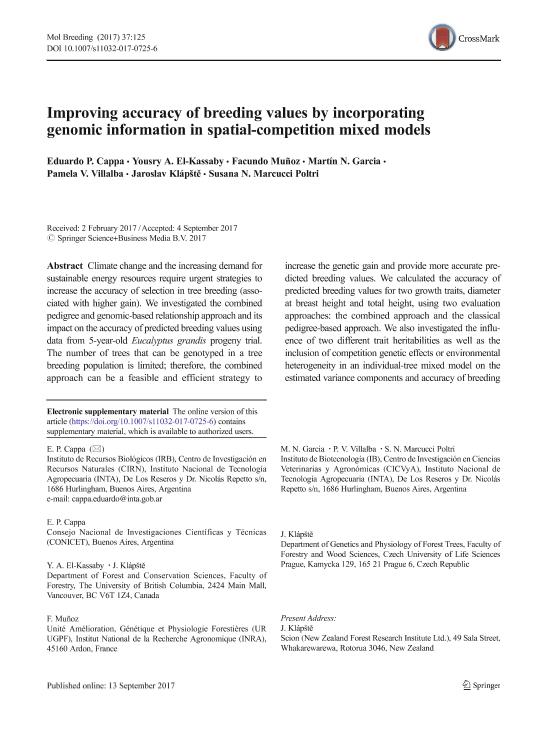Mostrar el registro sencillo del ítem
dc.contributor.author
Cappa, Eduardo Pablo

dc.contributor.author
El-Kassaby, Yousry A.
dc.contributor.author
Muñoz, Facundo
dc.contributor.author
Garcia, Martín Nahuel

dc.contributor.author
Villalba, Pamela Victoria

dc.contributor.author
Klápste, Jaroslav
dc.contributor.author
Marcucci Poltri, Susana Noemí

dc.date.available
2019-03-20T17:48:01Z
dc.date.issued
2017-10
dc.identifier.citation
Cappa, Eduardo Pablo; El-Kassaby, Yousry A.; Muñoz, Facundo; Garcia, Martín Nahuel; Villalba, Pamela Victoria; et al.; Improving accuracy of breeding values by incorporating genomic information in spatial-competition mixed models; Springer; Molecular Breeding; 37; 10; 10-2017
dc.identifier.issn
1380-3743
dc.identifier.uri
http://hdl.handle.net/11336/72100
dc.description.abstract
Climate change and the increasing demand for sustainable energy resources require urgent strategies to increase the accuracy of selection in tree breeding (associated with higher gain). We investigated the combined pedigree and genomic-based relationship approach and its impact on the accuracy of predicted breeding values using data from 5-year-old Eucalyptus grandis progeny trial. The number of trees that can be genotyped in a tree breeding population is limited; therefore, the combined approach can be a feasible and efficient strategy to increase the genetic gain and provide more accurate predicted breeding values. We calculated the accuracy of predicted breeding values for two growth traits, diameter at breast height and total height, using two evaluation approaches: the combined approach and the classical pedigree-based approach. We also investigated the influence of two different trait heritabilities as well as the inclusion of competition genetic effects or environmental heterogeneity in an individual-tree mixed model on the estimated variance components and accuracy of breeding values. The genomic information of genotyped trees is automatically propagated to all trees with the combined approach, including the non-genotyped mothers. This increased the accuracy of overall breeding values, except for the non-genotyped trees from the competition model. The increase in the accuracy was higher for the total height, the trait with low heritability. The combined approach is a simple, fast, and accurate genomic selection method for genetic evaluation of growth traits in E. grandis and tree species in general. It is simple to implement in a traditional individual-tree mixed model and provides an easy extension to individual-tree mixed models with competition effects and/or environmental heterogeneity.
dc.format
application/pdf
dc.language.iso
eng
dc.publisher
Springer

dc.rights
info:eu-repo/semantics/openAccess
dc.rights.uri
https://creativecommons.org/licenses/by-nc-sa/2.5/ar/
dc.subject
Breedr
dc.subject
Environmental Heterogeneity
dc.subject
Eucalyptus Grandis
dc.subject
Genetic And Environmental Competition Effects
dc.subject
Genomic Selection
dc.subject
Individual-Tree Mixed Model
dc.subject.classification
Otras Ciencias Naturales y Exactas

dc.subject.classification
Otras Ciencias Naturales y Exactas

dc.subject.classification
CIENCIAS NATURALES Y EXACTAS

dc.title
Improving accuracy of breeding values by incorporating genomic information in spatial-competition mixed models
dc.type
info:eu-repo/semantics/article
dc.type
info:ar-repo/semantics/artículo
dc.type
info:eu-repo/semantics/publishedVersion
dc.date.updated
2019-03-20T13:26:21Z
dc.journal.volume
37
dc.journal.number
10
dc.journal.pais
Países Bajos

dc.journal.ciudad
Dordrecht
dc.description.fil
Fil: Cappa, Eduardo Pablo. Consejo Nacional de Investigaciones Científicas y Técnicas; Argentina. Instituto Nacional de Tecnología Agropecuaria. Centro de Investigación de Recursos Naturales. Instituto de Recursos Biológicos; Argentina
dc.description.fil
Fil: El-Kassaby, Yousry A.. University of British Columbia; Canadá
dc.description.fil
Fil: Muñoz, Facundo. Centre de Recherche de Nantes. Institut National de la Recherche Agronomique; Francia
dc.description.fil
Fil: Garcia, Martín Nahuel. Consejo Nacional de Investigaciones Científicas y Técnicas; Argentina. Instituto Nacional de Tecnología Agropecuaria. Centro de Investigación en Ciencias Veterinarias y Agronómicas; Argentina
dc.description.fil
Fil: Villalba, Pamela Victoria. Instituto Nacional de Tecnología Agropecuaria. Centro de Investigación en Ciencias Veterinarias y Agronómicas; Argentina
dc.description.fil
Fil: Klápste, Jaroslav. University of British Columbia; Canadá. Czech University of Life Sciences Prague; República Checa
dc.description.fil
Fil: Marcucci Poltri, Susana Noemí. Instituto Nacional de Tecnología Agropecuaria. Centro de Investigación en Ciencias Veterinarias y Agronómicas; Argentina
dc.journal.title
Molecular Breeding

dc.relation.alternativeid
info:eu-repo/semantics/altIdentifier/doi/https://dx.doi.org/10.1007/s11032-017-0725-6
dc.relation.alternativeid
info:eu-repo/semantics/altIdentifier/url/https://link.springer.com/article/10.1007/s11032-017-0725-6
Archivos asociados
